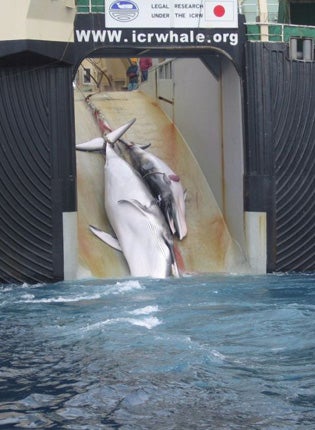The secret talks that threaten two decades of whale conservation

Your support helps us to tell the story
From reproductive rights to climate change to Big Tech, The Independent is on the ground when the story is developing. Whether it's investigating the financials of Elon Musk's pro-Trump PAC or producing our latest documentary, 'The A Word', which shines a light on the American women fighting for reproductive rights, we know how important it is to parse out the facts from the messaging.
At such a critical moment in US history, we need reporters on the ground. Your donation allows us to keep sending journalists to speak to both sides of the story.
The Independent is trusted by Americans across the entire political spectrum. And unlike many other quality news outlets, we choose not to lock Americans out of our reporting and analysis with paywalls. We believe quality journalism should be available to everyone, paid for by those who can afford it.
Your support makes all the difference.The future of the international whaling moratorium, one of the world's great conservation achievements, is being decided behind closed doors today and tomorrow, after whaling's governing body went into a secret session to discuss proposals that would end it.
The plan to legalise once again the hunting of the great whales, which has been outlawed since 1986, is so contentious that the International Whaling Commission (IWC), at its meeting in Agadir, Morocco, suspended its normal open meeting yesterday, for the first time ever, to allow countries on both sides of the argument to discuss it in private. The controversial proposal would allow the three nations that continue to hunt whales in spite of the ban and in defiance of world opinion – Japan, Norway and Iceland – to do so under a new legalised regime, for 10 years, in return for cutting back on the catches they currently make each year.
Japan says it is carrying out "scientific whaling", a fiction believed by no-one; the other two countries are simply ignoring the moratorium. In recent years more than 1,000 whales have been killed annually, with more than 2,000 in the peak year of 2006.
Supporters of the plan, originally put forward by the United States as a way of securing the right to carry on whaling by its own Inuit peoples of Alaska, say it will substantially reduce the numbers of whales actually killed each year by the whaling nations. The new "quotas" of whales allowed to be killed would be a matter for negotiation within the IWC.
But opponents, which include Britain, fear that once the principle of abandoning the moratorium is conceded, it will be impossible to keep the renewed commercial hunting in check. They point out that even if the three whaling countries are still killing, the numbers of whales dying each year is but a tiny fraction of those killed annually before the ban on legal commercial whaling came in.
Yesterday Sir Paul McCartney led international calls to prevent the moratorium being scrapped, issuing a statement through the World Society for the Protection of Animals (WSPA) calling for an end to the killing of the marine mammals.
"It's time to end the cruel slaughter of whales and leave these magnificent creatures alone," the singer said. "In the 21st century how can we even contemplate killing whales – or any animal – in such barbaric ways? Governments should act on their responsibilities and protect these beautiful creatures."
The WSPA's marine mammal programme manager Joanna Toole said the latest plan could allow almost 13,000 whales to be killed over the next 10 years. "This misguided proposal would resuscitate the world's dying whaling industries and would be a huge step backwards for animal welfare and conservation globally," she said.
Robbie Marsland, UK director of the International Fund for Animal Welfare (Ifaw), said: "Ifaw opposes commercial whaling because it is cruel and unnecessary. We urge all IWC member countries to vote the right way – to preserve the whaling ban and protect whales."
However, environment groups are not united. The World Wide Fund for Nature (WWF), the Pew Environment Group and Greenpeace believe the IWC proposals could work if there were changes to ensure there was no whaling in the Southern Ocean, where Japan currently sends fleets into a whale sanctuary, and no threatened species or populations were hunted – although the three groups make it clear they still support the global moratorium on whaling.
Yesterday's meeting got off to a controversial start when, within minutes of opening the annual conference the commission's deputy chairman, Anthony Liverpool of Antigua, adjourned the open sessions for two days to give pro- and anti-whaling countries a chance to discuss whether a compromise was possible.
Calling it "fundamentally unacceptable," Wendy Elliott of WWF International said all the preparations for the meeting were held in secret, and "now is the moment to open up a transparent and honest discussion".
But in terms of what eventually happens, another issue is more important – and that is how the EU countries vote. Of the 27 member states of the European Union, 25 are also members of the IWC, and thus represent a formidable voting block which might well be able to ensure the defeat of the plan to scrap the moratorium. Discussions between EU member states were going on last night in Agadir.
Join our commenting forum
Join thought-provoking conversations, follow other Independent readers and see their replies
Comments